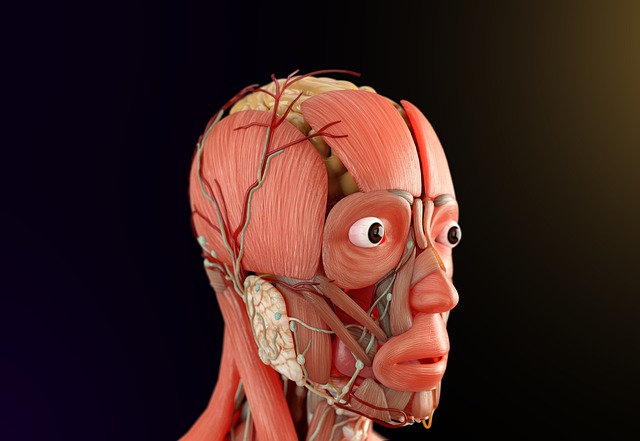The Endocannabinoid System (ECS) is a complex network crucial for maintaining balance in mammals, including humans. It comprises endocannabinoids (like anandamide and 2-AG), receptors (CB1 and CB2), and enzymes, working together to regulate mood, memory, appetite, pain, inflammation, and immune function. Understanding the ECS is key to comprehending how cannabis interacts with our bodies, opening doors to potential therapeutic uses for conditions like chronic pain, anxiety, and neurological disorders. This system acts as a bridge between external stimuli and internal balance, ensuring optimal immune responses and maintaining overall health.
The Endocannabinoid System (ECS) is a complex physiological network found in all mammals, playing a pivotal role in maintaining homeostasis. This intricate system regulates various key physiological processes, from pain perception and immune response to mental health and metabolic balance. By understanding the ECS, we unlock potential therapeutic avenues beyond cannabis, exploring natural ways to support this vital system. Delve into this comprehensive guide to unravel the mysteries of the ECS and its profound impact on our well-being.
What is the Endocannabinoid System?

The Endocannabinoid System (ECS) is a complex cellular system found in all mammals, including humans. It plays a crucial role in maintaining homeostasis, the body’s internal balance, by regulating various physiological processes such as mood, memory, appetite, and pain sensation. The ECS consists of endocannabinoids, receptors, and enzymes that work together to create a dynamic interplay within the body.
Endocannabinoids are neurotransmitters produced naturally by our bodies, with the most well-known being anandamide (AEA) and 2-arachidonoylglycerol (2-AG). These molecules bind to specific receptors, primarily CB1 and CB2, which are widely distributed in the brain and immune system, respectively. This binding triggers cellular responses that help regulate energy balance, pain perception, inflammation, and even cognitive functions. Understanding the ECS is essential as it provides insights into how certain plants, like cannabis, interact with our bodies, highlighting its significance in both physiological processes and potential therapeutic applications.
The Role of Cannabinoids in the Body

The Endocannabinoid System (ECS) is a complex cellular network found in all mammals, playing a crucial role in maintaining homeostasis — the body’s internal balance. This system isn’t just about cannabis; it’s an integral part of our physiological processes, regulating everything from appetite and pain perception to mood and memory. At its core are endocannabinoids, which are produced by our bodies and act as chemical messengers, binding to specific receptors in various organs and tissues.
Cannabinoids, like THC and CBD found in cannabis plants, interact with this system by mimicking the action of endocannabinoids. They bind to the same receptors, influencing the body’s response to stress, inflammation, and pain. This interaction highlights the potential therapeutic benefits of cannabinoids in managing conditions such as chronic pain, anxiety, and even certain neurological disorders, further underscoring the significance of understanding the Endocannabinoid System.
How the ECS Regulates Key Physiological Processes

The Endocannabinoid System (ECS) is a complex biological system found in all mammals that plays a pivotal role in maintaining homeostasis, the body’s internal balance. This intricate network of receptors, enzymes, and endocannabinoids (e.g., anandamide, 2-AG) interacts to regulate various physiological processes. By modulating pain sensation, appetite, mood, memory, immune function, and even reproductive health, the ECS ensures optimal cellular communication and response to internal and external stimuli.
Understanding the ECS is crucial in comprehending how mammals adapt and respond to their environment. Its regulatory functions are particularly evident during stress or injury, where it helps mitigate inflammation and promote healing. The ECS’ ability to influence such diverse processes makes it a fascinating subject of study in both basic science research and medical applications, offering potential insights into the treatment of various conditions and disorders.
The Impact on Pain Perception and Management

The Endocannabinoid System (ECS) is a complex physiological system found in all mammals, playing a pivotal role in maintaining homeostasis—the body’s internal balance. This intricate network of receptors and endogenous cannabinoids helps regulate various bodily functions, including pain perception and emotion. Understanding the ECS is crucial in comprehending how our bodies respond to and manage pain.
Activating the ECS through exogenous cannabinoids, like those found in cannabis, can significantly impact pain management. These compounds interact with the body’s endocannabinoid receptors, CB1 and CB2, which are abundant in the nervous system and immune cells, respectively. This interaction modulates pain signals, leading to reduced inflammation and altered pain perception. The ECS’ involvement offers a promising avenue for developing novel analgesics and treating conditions where pain management is challenging.
Understanding the Immune System's Connection to the ECS

The Endocannabinoid System (ECS) plays a pivotal role in maintaining homeostasis, especially in relation to the immune system. This intricate system is present in all mammals and serves as a key regulator of various physiological processes, including inflammation and immune response. The ECS acts as a bridge between the external environment and the body’s internal balance, ensuring that the immune system functions optimally without excessive activation or suppression.
Understanding the connection between the immune system and the ECS is crucial. When the body encounters pathogens or injuries, the ECS modulates the inflammatory response by interacting with specific receptors on immune cells. This interaction helps control the release of cytokines, which are signaling molecules responsible for mounting an appropriate immune reaction. By fine-tuning this process, the ECS prevents damage from both overactive inflammation and a weakened immune response.
The Role of Endocannabinoids in Mental Health

The Endocannabinoid System (ECS) is a complex biological system present in all mammals, playing a crucial role in maintaining homeostasis—the body’s internal balance. It consists of endocannabinoids, receptors, and enzymes that work together to regulate various physiological processes, including mood, appetite, memory, and pain perception. Understanding the ECS is essential in unraveling many aspects of mental health.
Endocannabinoids, such as anandamide and 2-AG, act as neurotransmitters that bind to cannabinoid receptors (CB1 and CB2) found throughout the brain and body. This binding triggers cellular responses that can modulate neural circuits involved in emotional processing, stress response, and cognitive functions. Imbalances or dysregulation in the ECS have been linked to several mental health disorders, including depression, anxiety, and psychotic conditions. Targeting the endocannabinoid system with therapeutic interventions, such as cannabinoids or compounds that modulate its activity, offers a promising avenue for novel treatments in psychiatry.
Potential Therapeutic Applications Beyond Cannabis

The potential therapeutic applications of compounds similar to those found in cannabis extend far beyond its well-known effects on the central nervous system. Understanding the Endocannabinoid System (ECS) reveals a complex network involved in regulating various physiological processes, including pain perception, inflammation, appetite, and mood. This system comprises endocannabinoids—naturally occurring molecules within our bodies—and receptors that bind to these compounds, such as anandamide and 2-AG.
Research suggests that modulating the ECS could offer promising treatments for numerous health conditions. For instance, certain plant-derived compounds have shown potential in managing chronic pain, reducing inflammation, and alleviating symptoms of anxiety and depression. By interacting with the ECS, these substances may provide alternative or adjunctive therapies for a range of disorders, further expanding our understanding of this fascinating biological system.
Research and Future Prospects for ECS-Targeted Treatments

Research into the endocannabinoid system (ECS) continues to unlock exciting possibilities for targeted treatments across various health conditions, offering a promising avenue for future therapies. Understanding the ECS involves delving into its intricate role in maintaining homeostasis within the body’s complex network. By studying how this system interacts with specific receptors, researchers can identify novel targets for interventions. This approach has already led to advancements in managing pain, inflammation, and neurological disorders, providing relief to patients suffering from these conditions.
The future prospects for ECS-targeted treatments are robust, driven by ongoing scientific explorations and technological innovations. With further research, it may be possible to develop personalized medicine approaches, tailoring treatments to individual ECS profiles. This precision could enhance therapeutic outcomes and minimize adverse effects, marking a significant step forward in healthcare. As our knowledge expands, the potential applications of ECS-targeted interventions are likely to extend beyond existing areas, opening new frontiers in treating diseases once considered challenging.
Exploring Natural Ways to Support the Endocannabinoid System

The Endocannabinoid System (ECS) is a complex network of signaling molecules and receptors found in all mammals, playing a crucial role in maintaining homeostasis—the body’s internal balance. By understanding the ECS, we can explore natural ways to support its optimal function. This system regulates various physiological processes, including appetite, pain sensation, mood, memory, and sleep. The primary endocannabinoids, such as anandamide and 2-AG, act as lipophilic messengers, binding to receptors CB1 and CB2 to modulate neural activity and immune responses.
One way to support the ECS naturally is through diet and nutrition. Certain foods are rich in fatty acids—like omega-3 and omega-6—which are essential for endocannabinoid production. Additionally, incorporating herbals like hemp, chamomile, and spearmint may provide mild supportive effects due to their contents of cannabidiol (CBD) and other compounds that interact with the ECS. Regular exercise is another powerful tool, as physical activity stimulates the release of endorphins and promotes the health of cannabinoid receptors, fostering a balanced ECS.
